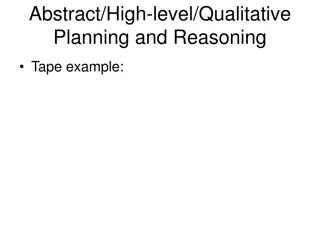Quantitative Research Designs in Health Research
Quantitative research designs play a crucial role in health research, offering various methodologies like experimental and observational designs. Observational designs are commonly used and can establish associations but not causality. Longitudinal designs track outcomes over time, providing valuabl
4 views • 25 slides
Quantitative and Qualitative Research Methods
Exploring the differences between quantitative and qualitative research methods, this content delves into the importance of qualitative research, various methodologies such as focus groups and interviews, data collection, research ethics, and analysis techniques. It also covers the elements of the r
5 views • 43 slides
Best Home alterations in North Shore
If you\u2019re looking for Home alterations in North Shore, contact Malloch Architecture Ltd. They offer a wide range of services from custom home designs and home alterations to architectural designs and building designs. Their success is attributed to a personal approach to every client. They will
0 views • 6 slides
Qualitative Research: Foundations and Orientations
Explore the foundations of qualitative research and orientations to meaning in Big Q qualitative methods. Delve into the values, characteristics, and theoretical underpinnings of qualitative inquiry, and reflect on the significance of meaning-making in research. Consider the role of subjectivity in
1 views • 23 slides
The Case Study Method: In-depth Qualitative Analysis
The case study method is a popular form of qualitative analysis involving intensive observation of a social unit. It focuses on detailed analysis of a limited number of events or conditions to understand complex interrelationships. Characteristics include intensive study of a single unit, qualitativ
1 views • 8 slides
Enhancing Natural Experiment Research Through Qualitative Work
Qualitative research plays a crucial role in enhancing natural experiment studies by providing insights into the processes of exposure to interventions, identifying variables influencing exposure likelihood, and determining suitable control groups. Complementary methods within the RE-AIM framework a
1 views • 13 slides
Qualitative Data Analysis Techniques in Research
The purpose of data analysis is to organize, structure, and derive meaning from research data. Qualitative analysis involves insight, creativity, and hard work. Researchers play a crucial role as instruments for data analysis, exploring and reflecting on interview discussions. Steps include transcri
2 views • 27 slides
Using Qualitative Methods in Quality Improvement Projects
Qualitative methods offer valuable insights in quality improvement projects by capturing non-numerical information like experiences, thoughts, and perspectives. They help to understand patient and staff perspectives, challenges, and successes in QI initiatives. Utilizing techniques such as interview
2 views • 21 slides
Factorial Designs in Experiments
Factorial designs in experiments allow researchers to study the effects of multiple independent variables simultaneously. This type of design enables the examination of main effects and interactions between factors, providing a comprehensive understanding of the research variables. Main effects refe
1 views • 25 slides
Experiential vs. Critical Qualitative Research
Delve into the foundations of qualitative research with a focus on experiential and critical approaches. Explore key concepts, defining characteristics, and theoretical foundations, distinguishing between qualitative and quantitative research. Reflect on different orientations, subjectivity, and ref
0 views • 16 slides
Key Characteristics of Qualitative Research in Psychology
The lecture series delves into the values, characteristics, and theoretical foundations of qualitative research, emphasizing the differences from quantitative methods. It explores experiential and critical qualitative camps, subjectivity, reflexivity, and ontological and epistemological foundations.
4 views • 18 slides
Ensuring Trustworthiness in Qualitative Research Studies
Trustworthiness in qualitative research is essential for establishing confidence in the study outcomes. Guba's four criteria - credibility, transferability, dependability, and confirmability - provide a framework for achieving trustworthiness. Strategies such as adopting reliable research methods, u
4 views • 10 slides
Explanatory Cross-Sectional Designs in Research
Explore the world of cross-sectional designs in research, focusing on the explanatory type that delves into relationships among variables within populations. Learn about the distinctive features, types of designs, and research objectives associated with this methodology.
3 views • 23 slides
NVivo: A Brief Introduction to Qualitative Data Analysis Software
Explore the world of NVivo with Dr. Will Fassbender, an Assistant Professor at Montana State University. Gain insights into qualitative data analysis, download procedures, basic functions, and more. Join this introductory session to discover how NVivo can streamline your research process and aid in
3 views • 16 slides
Contrasting Qualitative and Quantitative Traits in Genetics
Genetic traits in organisms can be qualitative or quantitative, with qualitative traits controlled by single genes and showing distinct variations, while quantitative traits are influenced by multiple genes and environmental factors, resulting in continuous variations. Qualitative genetics focuses o
1 views • 13 slides
Qualitative vs. Quantitative Approaches in Health Research
Exploring the different methodologies, paradigms, and methods used in health research, this content highlights the distinction between qualitative and quantitative designs. It covers research questions, aims, objectives, hypotheses, and various quantitative approaches such as experimental and observ
1 views • 28 slides
Qualitative Analysis of Aldehydes and Ketones in Chemistry Lab
In this Chemistry 318 lab, students will conduct qualitative analysis of aldehydes and ketones using chemical and spectroscopic methods. The lab includes classification tests, spectroscopy (IR, 1H-NMR/13C-NMR, MS), and identification of unknown compounds. Experimental procedures involve physical eva
2 views • 11 slides
Clinical Trials: Types and Designs
Clinical trials are essential research studies that evaluate new tests and treatments to improve human health outcomes. They involve various phases, designs, and purposes, such as treatment trials, prevention trials, and observational studies. Different types of clinical trial designs include experi
7 views • 18 slides
Quantitative Genetics Principles in Animal Breeding
Quantitative genetics focuses on the inheritance of characteristics based on degree rather than kind, compared to qualitative genetics. It involves polygenes controlling quantitative traits, which exhibit continuous variation and can be measured using metric units. Qualitative traits, on the other h
1 views • 22 slides
Quantitative Designs in Health Research
Explore different types of quantitative research designs including observational, longitudinal, and case-control studies. Learn how these designs are used to establish associations, measure outcomes over time, and compare groups. Discover the advantages and disadvantages of longitudinal designs in c
1 views • 25 slides
Qualitative Methodology: An Overview
This presentation delves into the realm of qualitative methodology, exploring its purpose, characteristics, approaches, data collection methods, analysis, and learning outcomes. It aims to provide a deep understanding of how qualitative research illuminates voices and experiences, distinguishes betw
1 views • 41 slides
Qualitative Approaches in a Data-Intensive World
Qualitative research involves studying perceptions, experiences, and behaviors through verbal or visual expressions. In a data-intensive world, online communication plays a crucial role in data collection. Qualitative eResearch utilizes Information and Communication Technologies (ICTs) strategically
0 views • 10 slides
Meaning and Meaning-making in Big Q Qualitative Research
Qualitative research explores different understandings of meaning and meaning-making, providing researchers with tools, techniques, and values. Big Q qualitative research focuses on the active role of words in creating meaning beyond reflecting experiences. This lecture series delves into the founda
2 views • 20 slides
Healthy Breakfast in a Jar Designs for On-the-Go Nutrition
In this project, students are tasked with designing and creating four different Breakfast in a Jar options that promote healthy eating. They need to consider ingredients that provide energy, protein, fiber, vitamins, and minerals. The designs should be colorful, incorporate a variety of textures, an
0 views • 11 slides
Exciting School Spirit Shirts Now Available for Online Orders!
Unleash your school spirit with a range of creatively designed spirit shirts available for online purchase. Each shirt has its own unique link for easy ordering. Simply follow the link provided to explore and order your favorite designs. Visit Poinciana High School's online store to discover more op
0 views • 8 slides
Analyzing Qualitative Data: Steps and Coding Methods
Understanding qualitative data analysis involves several key steps, such as preparing the data through transcription, developing codes and categories using content analysis, revising categories based on the data, and reporting the analysis results. Content analysis helps in identifying words, themes
0 views • 32 slides
Design Philosophy for Increasing Accessibility in Qualitative Data Analysis Software
Growing interest in qualitative research methods has led to increased use of Qualitative Data Analysis Software (QDAS). However, challenges remain in making these tools accessible and easy to use, especially in educational settings. This article explores design philosophies to enhance accessibility
0 views • 16 slides
Analyzing U.S. Higher Education Success Metrics: A Qualitative Perspective
Delve into the nuances of U.S. higher education success metrics through a qualitative analysis, exploring the classification of qualitative successes in quantitative datasets and the factors influencing accurate or inaccurate classifications. The study involves individuals who attended community col
1 views • 18 slides
Perceived Risks and Risks Mitigation Practices in Informal Waste Workers: A Qualitative Study
A qualitative study conducted in Kathmandu Valley exploring the perceived risks and mitigation practices of informal waste workers. The research project, led by Sujata Sapkota, aims to address the occupational and health challenges faced by these workers. The study includes a mix of quantitative and
0 views • 22 slides
Strategies for Collective Qualitative Secondary Analysis Using Combined Datasets
Collective qualitative secondary analysis involves reusing data through a collaborative lens, embracing multiple viewpoints to gain deeper insights. The approach emphasizes the constructed nature of research data and allows for diverse interpretations and engagements. This article discusses the proc
1 views • 15 slides
Research Methods in Public Health
Exploring the nuances of qualitative and quantitative research methods in the context of public health, this content delves into how each approach offers unique insights and perspectives. It discusses the importance of qualitative research in uncovering underlying factors influencing health, interpr
1 views • 77 slides
Qualitative Approach in Cognitive Interview Data Analysis
Understanding the importance of a qualitative approach in analyzing cognitive interview data is crucial for uncovering patterns and recurring themes. This involves delving deeper into the why behind the responses rather than just naming and classifying data. Using methods like standardised coding sc
0 views • 18 slides
Creative Problem Solving through High-level Qualitative Planning and Reasoning
Explore the world of abstract and high-level qualitative planning through examples like MacGyver's inventive solutions, opening jar tricks, and audience participation in problem-solving. Witness how qualitative reasoning can lead to innovative solutions in various scenarios.
0 views • 15 slides
Qualitative Data in Counseling
Exploring the challenges and strategies in utilizing qualitative data in counseling, this discussion covers topics such as data collection, coding for meaning, and presenting qualitative evidence. The importance of qualitative data in improving counseling programs and student services is highlighted
0 views • 32 slides
Special Topics in Design: Factorial Experiments and Fractional Designs
This content delves into the world of factorial designs used in design experiments to identify important factors and interactions. It explores 2k full factorial designs and their application in screening potential factors. Additionally, the content discusses 2k-p fractional factorial designs and the
0 views • 19 slides
Foundations of Qualitative Research: Understanding Methods and Data
Qualitative research involves a mix of different methods drawing on qualitative data, with debates on the need for a sensitive approach for richer appreciation. Understanding qualitative data and context, along with various types of data such as interviews and user-generated content, is essential fo
0 views • 41 slides
Experimental Studies in Epidemiology
Epidemiological studies and experimental studies play vital roles in understanding cause-and-effect relationships in research. Experimental studies involve manipulating independent variables and measuring dependent variables, with categories such as true experimental, quasi-experimental, and pre-exp
0 views • 22 slides
Paired-Samples Designs in Research
Paired-samples designs are valuable in research when the assumption of independence is violated, leading to dependency across groups. These designs involve comparing means of two related groups with smaller variance in the dependent variable. Repeated-measures designs offer a framework for successiv
0 views • 20 slides
UPVC Windows Designs India – Fabiron Exports
When it comes to UPVC windows designs in India, Fabiron Exports offers an impressive selection that blends style, durability, and energy efficiency. These modern window designs are crafted to suit diverse architectural styles, providing a perfect fit
0 views • 2 slides
Faces of Mindfulness in Qualitative Research: A Comprehensive Perspective
Dive into the multifaceted applications of mindfulness in qualitative research as explained by Dr. Ryan Rominger, providing insightful perspectives on its integration and impact within the field. Discover the diverse aspects and nuances of applying mindfulness practices in qualitative research setti
0 views • 19 slides







































